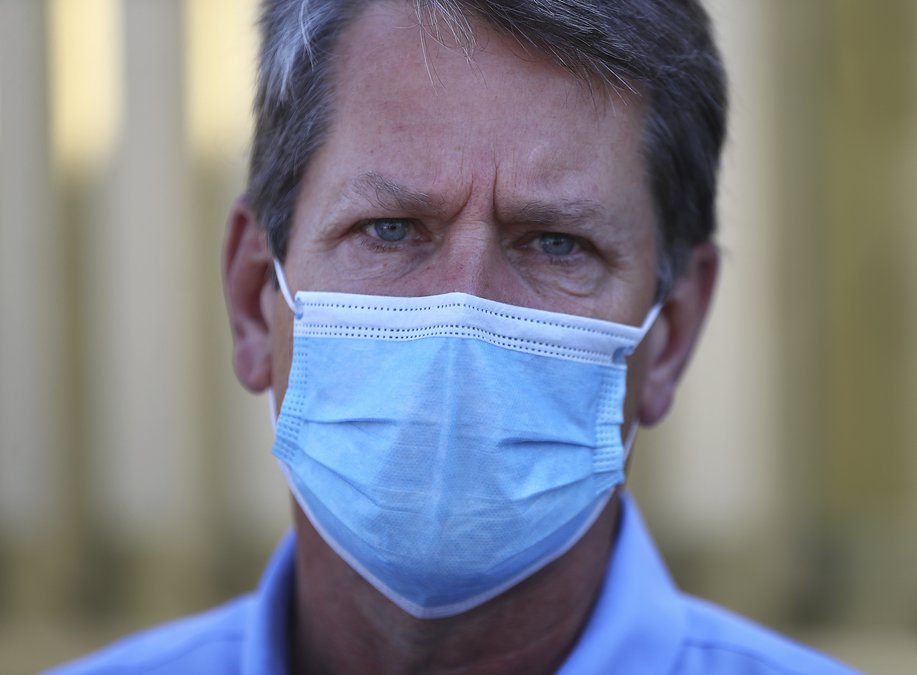ATLANTA — Georgia Gov. Brian Kemp eased a few restrictions Tuesday on businesses and child care operations, but said he was keeping most current rules until at least the end of May.
The Republican governor reiterated that he believes Georgia is containing the COVID-19 respiratory illness, despite areas of concern.
Kemp said he's most encouraged by low demand for critical care hospital beds since he started loosening restrictions last month.
"Whatever's happening out there, nobody's going to the hospital because of it," Kemp said at a news conference.
The number of hospitalized patients fell again Tuesday to 1,125 statewide, the lowest since the state began keeping those statistics on April 8. Meanwhile, the number of ventilators in use ticked up to 884.
Total state numbers as of Tuesday evening, per the Georgia Department of Health, were as follows: 262,179 tests administered; 34,848 confirmed COVID-19 cases; 6,227 hospitalizations; 1,479 ICU admissions; and 1,494 deaths.
Bulloch County's reported numbers were 45 confirmed cases and two deaths.
Top health experts continue to warn that loosening restrictions too quickly could spark a resurgence of infections. Kemp has captured nationwide attention with his reopening moves because they were among the earliest and most aggressive. He said Tuesday he's focused on "two battles that we're fighting right now: One, to stop the spread of COVID-19, and No. 2, the economic battle that we're in to bring our economy back in our state."
Positive cases reported today reflect infections that occurred two weeks earlier, so Georgia may just now be seeing the impact of businesses reopening, said Robert Bednarczyk, an epidemiologist at the Rollins School of Public Health at Emory University. That's a point Kemp also made.
The drop in the number of people in hospitals was good in case of another surge, "but it doesn't necessarily mean that we're out of the woods right now," Bednarczyk said.
Geographic hot spots and disproportionate harm to African Americans and Hispanics are also risks. The Morehouse School of Medicine on Tuesday released a study that found that, even when accounting for differences in poverty, health insurance and population density, Georgia counties with higher shares of African American residents have higher rates of confirmed COVID-19.
The Northeast Georgia Health System, a four-hospital group based in Gainesville, still says that it could exceed the capacity of its staff to care for patients next week. The hospital system's patient numbers have held steady in recent days, but the share of ventilators in use rose to 44% of capacity Tuesday from 38% Monday. The region has large numbers of Spanish-speaking residents concentrated in poultry plants.
Santiago Marquez, president of the Hispanic Chamber of Commerce and a member of Kemp's coronavirus task force, told The Valdosta Daily Times that undocumented immigrants fear testing sites staffed in part by National Guard members.
"I don't think we have a good handle on how many Hispanics actually are infected as we do with the general community," Marquez said.
Kemp said African Americans, Hispanics and residents of long term care facilities are "where we've got to focus our efforts every day." He said 46% of nursing home residents in 142 facilities statewide have been tested, but 46,000 people still need to be evaluated.
The governor said Georgia just received 1,200 doses of remdesivir, a drug with promise in alleviating COVID-19. Public Health Commissioner Kathleen Toomey pledged Georgia would have 1,000 contact tracers in place by June 23 to track the spread of the disease and encourage at-risk people to quarantine, up from 250 now.
Kemp spoke just after signing a new executive order that allows restaurants to serve 10 diners per 300 square feet instead of the current 500 square feet, and increased the maximum number of people who can be seated together from six to 10. It also allows summer day camps to begin operating this week subject to restrictions, although overnight camps remain banned for now. The governor allowed the number of children and teachers per room at a child care facility to rise to 20 from the current 10.
Bars, nightclubs and performance venues remain closed for now. Restrictions on other business operations also remain. Kemp said he would decide at the end of the month whether to loosen more restrictions.
Georgia Attorney General Chris Carr sent a letter Tuesday to Congress signed by 20 other Republican attorneys general calling for lawsuit protections to cover businesses, manufacturers of personal protective equipment, emergency workers, healthcare workers, healthcare facilities, and law enforcement officers.
Carr wrote that Congress and states should enact a "common-sense framework to provide liability protections for much-needed goods and services while still ensuring victims are able to seek legal redress and compensation where appropriate."
For most people, the coronavirus causes mild or moderate symptoms that clear up within weeks. For some, especially older adults and people with existing health problems, it can cause more severe illness and be fatal.
For more AP coverage of the virus outbreak, visit https://apnews.com/VirusOutbreak or https://apnews.com/UnderstandingtheOutbreak.


